
MC Skat Kat is an animated cat character who appeared with Paula Abdul in the video for her song "Opposites Attract" in 1989.
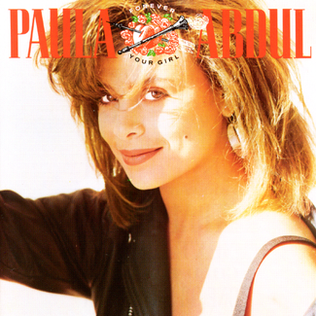
Forever Your Girl is the debut studio album by American singer Paula Abdul. It was released on June 21, 1988, through Virgin Records. The album was Abdul's breakthrough into the music industry after being a choreographer for high-profile clients including Kate Bush, The California Raisins, George Michael, ZZ Top, Duran Duran and most notably Janet Jackson. At the time of the album's release it was the most successful debut album of all time and was the first time an artist scored four US Billboard Hot 100 number-one singles from a debut album. It is currently certified 7× platinum by the RIAA.

"Angel" is a song by Canadian singer-songwriter Sarah McLachlan. The song first appeared on McLachlan's fourth studio album, Surfacing, in 1997 and was released as the album's fourth and final single in September 1998. The lyrics are about the death of musician Jonathan Melvoin (1961–1996) from a heroin overdose, as McLachlan explained on VH1 Storytellers. It is sometimes mistitled as "In the Arms of an Angel". or "Arms of the Angel".
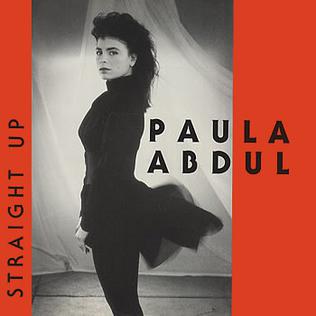
"Straight Up" is a song by American recording artist Paula Abdul from her debut studio album, Forever Your Girl (1988). The song is a mid-tempo dance-pop song with influence from new jack swing. Written and produced entirely by Elliot Wolff, the song was released as the album's third single on November 22, 1988, by Virgin Records.
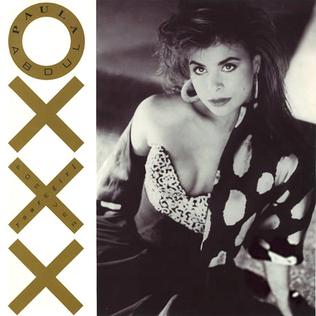
"Forever Your Girl" is a song by American singer Paula Abdul from her debut studio album, Forever Your Girl (1988). The song was written and produced by Oliver Leiber, with additional production by Keith "K.C." Cohen. Virgin Records released it as the album's fourth single on February 20, 1989.

"Smooth" is a song performed by American rock band Santana and Rob Thomas of Matchbox Twenty, who sings the lead vocals. It was released on June 15, 1999, as the lead single from Santana's 1999 studio album, Supernatural. It was written by Itaal Shur and Thomas, who re-wrote Shur's original melody and lyrics, and produced by Matt Serletic.
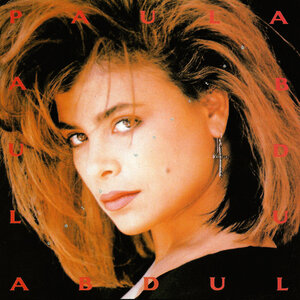
"Cold Hearted" is a song by American singer Paula Abdul, released in June 1989 as the fifth single from her debut album, Forever Your Girl (1988). It was written and co-produced by Elliot Wolff and reached number one on the US Billboard Hot 100, becoming the album's third song to top the US chart.

"Hold On" is a song by American vocal group Wilson Phillips, released on February 27, 1990 by SBK, as the lead single from their debut studio album, Wilson Phillips (1990). The song topped the US Billboard Hot 100 for a week in June 1990 and was the most successful single of that year in the US. It also became a worldwide hit, peaking within the top three in Australia and Canada and the top 10 in Belgium, Ireland, New Zealand, Sweden, and the United Kingdom. The song received platinum sales certifications in Australia and the UK and a gold certification in the US. Julien Temple directed its music video.

"Rush Rush" is a song by American recording artist Paula Abdul, taken from her second studio album, Spellbound (1991). It was released on April 24, 1991, by Virgin Records as the lead single from the album. Written by Peter Lord and produced by Peter Lord and V. Jeffrey Smith, the song achieved success in the United States, where it topped the Billboard Hot 100, and became a worldwide hit.

"Release Me" is a song written and performed by American pop group Wilson Phillips, released as the second single from their debut album, Wilson Phillips (1990). The song reached number one on the US Billboard Hot 100 in September 1990 and spent two weeks at number one. It also topped the Billboard Hot Adult Contemporary chart for one week and reached number one in Canada the same month.
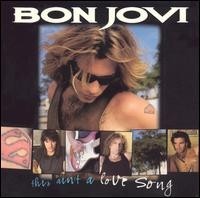
"This Ain't a Love Song" is the lead single from American rock band Bon Jovi's sixth studio album, These Days (1995). The rock ballad is an example of the strong rhythm and blues influence that Jon Bon Jovi and Richie Sambora wanted the album to have. Released in May 1995 by Mercury, it reached number 14 on the US Billboard Hot 100, number two on the Canadian RPM 100 Hit Tracks chart, number six on the UK Singles Chart, and number one on the Finnish Singles Chart.

"(It's Just) The Way That You Love Me" is a song recorded by American singer Paula Abdul for her debut album Forever Your Girl (1988). Written and produced solely by producer Oliver Leiber, the song was originally released in its remix form as the second single from the album on August 2, 1988, by Virgin to minor success in the States. Following the breakthrough success of her next three singles, the song was re-released on September 15, 1989, under its original version to commercial success, becoming Abdul's fourth consecutive top three entry on the Billboard Hot 100 and to date, tying with "Straight Up" as her longest charting performance on the chart. The song, however, did not replicate the same success in the UK where it managed to peak at number seventy-four on the UK Singles Chart, thus becoming her lowest charting single in the region to date.
The Wild Pair, whose real names are Bruce DeShazer and Marv Gunn, was a singing duo and voice actors who were primarily known for their 1989 hit duet with Paula Abdul, "Opposites Attract". They have also provided background vocals on her other hits, "Forever Your Girl" and "(It's Just) The Way That You Love Me."

"The Promise of a New Day" is the opening track and second single from American artist Paula Abdul's second studio album, Spellbound (1991). The song was written by Paula Abdul, Peter Lord and V. Jeffrey Smith. It became Abdul's sixth and final number-one hit on the US Billboard Hot 100.

"Impulsive" is a song by American pop group Wilson Phillips, released as the third single from their debut album, Wilson Phillips (1990). Written by Clif Magness and Steve Kipner, it was released in 1990 on SBK Records. The song reached number four on the US Billboard Hot 100 and number one on the Canadian RPM 100 Hit Tracks chart. It was the first single to feature Wendy Wilson as the lead vocalist and includes a slide guitar solo from Joe Walsh. Billboard ranked the song number 99 on their list of the "100 Greatest Girl Group Songs of All Time".

"My Love Is for Real" is a song by American singer and songwriter Paula Abdul with backing vocals from Israeli singer Ofra Haza. It was released on May 30, 1995 by Virgin and Captive, as the first single from Abdul's third studio album, Head over Heels (1995). Intended as Abdul's comeback single, "My Love Is for Real" reached number one in Hungary and the top 20 in Australia, Canada, and New Zealand, but it stalled outside the top 20 in the United States, peaking at number 28 on the Billboard Hot 100, and failed to make a major impact in Europe. The song's music video was directed by Michael Haussman.

"I Don't Want to Wait" is a song written, recorded, and produced by American singer-songwriter Paula Cole. Cole wrote the song in mid-1996 and released it as second single from her second studio album, This Fire (1996), on October 14, 1997. The single release was successful, reaching No. 11 in the United States and No. 5 in Canada. VH1 ranked "I Don't Want to Wait" as one of the 100 Greatest Songs of the '90s at No. 81. The song later served as the opening theme for the American teen drama television series Dawson's Creek, which ran from 1998 to 2003.

"Where Have All the Cowboys Gone?" is a song by American singer Paula Cole. It was released on March 25, 1997, as the lead single from her second studio album, This Fire. The song is Cole's only top-ten hit on the US Billboard Hot 100, reaching number eight, and was her first top-ten hit in Canada, where it reached number seven. It was additionally a critical success, earning nominations for three Grammy awards: Record of the Year, Song of the Year, and Best Female Pop Vocal Performance.

"She's a River" is the first single released from Scottish rock band Simple Minds' 11th studio album, Good News from the Next World. Written by band members Charlie Burchill and Jim Kerr, the song was inspired by Herman Hesse's novel Siddhartha, a book about self-discovery. Released on 11 January 1995, "She's a River" reached number three in Canada and Italy, number seven in the Flanders region of Belgium, and number nine on the UK Singles Chart. In the United States, it peaked at number six on the Billboard Album Rock Tracks chart.

The discography of American singer and dancer Paula Abdul consists of three studio albums, one remix album, five compilation albums, eight video albums, eighteen singles, and seven other appearances. Having found success as a choreographer for artists such as Janet Jackson, Abdul launched her own music career with the release of her debut studio album Forever Your Girl (1988). The album topped the Billboard 200 chart, and to date holds the record for the longest climb to number one for an album. The project spawned a number of successful singles, and is one of only nine albums to have four singles top the Billboard Hot 100 chart. It went on to earn a seven-times platinum certification from the Recording Industry Association of America (RIAA).


















